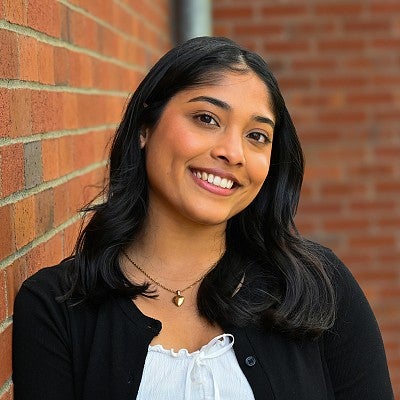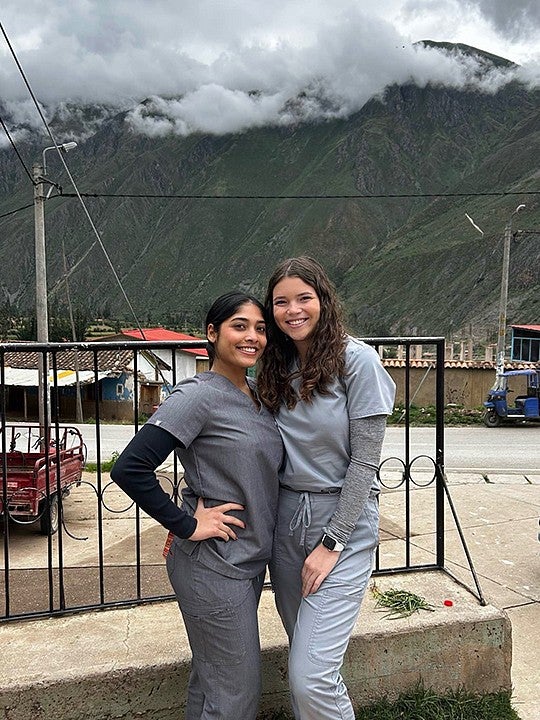
Changing the way we support others
Every Wednesday for two years, Aarushi Dhamdhere served as the hands for an elderly woman with severely progressive Parkinson’s disease so she could play the card game, Bridge.
As a caregiver at Home Instead Senior Care, Dhamdhere found joy in helping patients with their medical conditions and allowing them the agency to make their own decisions. This experience, she says, “fueled my passion for medicine.”
As a Clark Honors College human physiology major with minors in global health and chemistry, Dhamdhere is no stranger to rigorous science. Simultaneously, the Honors College gave her the flexibility to incorporate social and cultural studies into her academics, which she believes has been invaluable.
“Going into healthcare, you can’t just be single-minded,” she says. “You can’t just look at someone’s symptoms. You have to look at their whole history.”

Aarushi Dhamdhere
Major: Human Physiology
Minors: Global health and chemistry
Thesis: “An Ethical Evaluation of an International Nonprofit and the Implications of Foreign Aid”
Describe your experience at the CHC: Eye-opening and an outlet for creativity.
Advice on the thesis project: Just get words on paper. Get your ideas out.
This summer, I can’t wait for: Traveling and going to the beach.
What I’ll miss most about the CHC: The amazing professors.
I’m grateful for: My support system – parents and roommates.
Dream job: Neurosurgeon
MEDLIFE and service learning trips
Despite the demanding nature of her majors, Dhamdhere managed to stay involved on campus. As a sophomore, she worked under Arden Baylink, who was conducting his postdoctoral medical research project. She helped create antibodies against invasive stomach bacteria that cause ulcers, Crohn's disease, stomach cancer, and inflammatory bowel diseases.
Working with bacterial samples, carrying out experiments, and analyzing the data and how it affected diseases helped her feel like she was “one step closer to creating a solution” for people who were suffering. “It allowed me to bridge the gap between the science and the patients,” she says.
In September 2023, Dhamdhere revived UO’s MEDLIFE service learning chapter on campus after 10 years of dormancy. The club, which helps organize trips abroad for students to gain service experience, met bimonthly and has grown to more than 60 members. Participating in MEDLIFE allowed Dhamdhere to create a space where students had the opportunity to fundraise, volunteer, and connect with physicians and professionals in the medical field.

The national MEDLIFE organization facilitates service learning trips for its member chapters. In January 2024, Dhamdhere and 40 other students traveled to Cusco, Peru, to work in mobile clinics and gain hands-on experience with dispensing medical care. There, they assisted local physicians in administering checkups, dental care, prescriptions, and gynecological care.
The experience left Dhamdhere with mixed emotions. “I really loved that we got to give back and gain experience,” she says. “But I think there are some problems in service learning trips and ‘voluntourism’ itself.”
An overarching issue she found was the impermanence of volunteers engaged in the service learning trips. Volunteers would go to foreign countries for a week or two and then return home. Such trips don’t allow students to make long-term connections, she says.
Also, she says language barriers in Cusco prevented patients from being properly informed about their care, as most patients only spoke Spanish and volunteers only English. Additionally, Dhamdhere observed a lack of clean water available for patients and to properly clean the medical equipment students used.
This experience, she says, “fueled my goal for fighting toward more ethical healthcare and making sure that if students are going on service trips, there should be more requirements.”
Her thesis and future direction
Dhamdhere’s senior thesis was shaped by her experiences in Cusco. She explained that the drawbacks she observed could have been offset by improved training methods.
In her thesis, titled “An Ethical Evaluation of an International Nonprofit and the Implications of Foreign Aid,” Dhamdhere argued that future directions in international medical aid should be grounded in an ethical framework. She based her recommendations on the four tenets of medical ethics: autonomy, beneficence, nonmaleficence and justice. A large part of this includes “education for local populations so that one day there can be a primarily local volunteer population,” she says.
In terms of applications at UO, Dhamdhere believes there needs to be more “pre-trip planning and preparation” for service learning trips. In order to tackle these issues, she has worked to implement a permanent training system within MEDLIFE at UO that prepares students linguistically, culturally and ethically for when they travel to other countries.
Her thesis advisor and director of the UO’s Global Health Program, Associate Professor Jo Weaver, agrees. She stressed that the lack of knowledge Dhamdhere observed “puts everyone in danger—both students and the people receiving care.”
Dhamdhere hopes to bring this sort of mindful equity to healthcare in her future practice as a doctor. She is currently applying to medical schools – her dream being to attend New York University’s Grossman School of Medicine in Manhattan.
While she waits to hear where she will be accepted, Dhamdhere will be working as a medical scribe in the facial plastics and reconstruction surgery department at Oregon Health & Science University in Portland.

